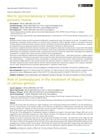 3 citations,
December 2022 in “npj Regenerative Medicine”
3 citations,
December 2022 in “npj Regenerative Medicine” HSPGs help control stem cell behavior, affecting hair growth and offering a target for hair loss treatments.
 10 citations,
May 2020 in “Dermatology Research and Practice”
10 citations,
May 2020 in “Dermatology Research and Practice” Proteoglycans are important for hair growth, and a specific treatment can help reduce hair loss.
 July 2021 in “Journal of dermatology research and therapy”
July 2021 in “Journal of dermatology research and therapy” COVID-19 may worsen hair loss, and Nourkrin® could be a safe treatment option, but more research is needed.
 December 2024 in “Deleted Journal”
December 2024 in “Deleted Journal” New therapies show promise for wound healing, but more research is needed for safe, affordable options.
 March 2024 in “International journal of nanomedicine”
March 2024 in “International journal of nanomedicine” Polymeric nanohydrogels show potential for skin drug delivery but have concerns like toxicity and regulatory hurdles.

Plant-based compounds can improve wound dressings and skin medication delivery.
 11 citations,
November 2022 in “JAMA dermatology”
11 citations,
November 2022 in “JAMA dermatology” Some nutritional supplements may help treat hair loss with generally mild side effects.
 15 citations,
September 2006 in “Journal of International Medical Research”
15 citations,
September 2006 in “Journal of International Medical Research” Nourkrin® significantly increased hair growth and was well-tolerated by people with hair loss.
 5 citations,
September 2016 in “Journal of Cosmetic Dermatology”
5 citations,
September 2016 in “Journal of Cosmetic Dermatology” Nourkrin® with Marilex® may increase hair count by 35.7% in postpartum hair loss.
 1 citations,
December 2017
1 citations,
December 2017 The study suggests that treating early hair loss with Nourkrin® with Marilex® can help prevent further hair loss and may be linked to reducing the risk of lifestyle diseases.
 September 2021 in “Медицинский совет”
September 2021 in “Медицинский совет” Proteoglycans, especially in Nourkrin®, can effectively and safely treat hair loss.

COVID-19 may increase hair loss, and Nourkrin® could help treat it.
 June 2020 in “Journal of clinical and investigative dermatology”
June 2020 in “Journal of clinical and investigative dermatology” Nourkrin® Woman with Marilex® improves hair growth, appearance, and confidence in women with hair loss.

Nourkrin® with Marilex® may significantly increase hair growth and alopecia could be an early sign of metabolic syndrome.
 10 citations,
December 2021 in “Frontiers in cell and developmental biology”
10 citations,
December 2021 in “Frontiers in cell and developmental biology” Glypican-1 is important for blood vessel growth in hair follicles and could help treat hair loss.
 1 citations,
December 2011
1 citations,
December 2011 Marine-derived ingredients show potential for hair health but need more human trials to confirm effectiveness.
 December 2023 in “Aesthetic Cosmetology and Medicine”
December 2023 in “Aesthetic Cosmetology and Medicine” COVID-19 can cause hair loss, but specialists can help treat it.
 October 2018 in “International journal of reproduction, contraception, obstetrics and gynecology”
October 2018 in “International journal of reproduction, contraception, obstetrics and gynecology” Most adult women with PCOS in Port Harcourt, Nigeria, have high levels of bad fats in their blood, especially younger women.
 April 2014 in “Journal of Aesthetic Nursing”
April 2014 in “Journal of Aesthetic Nursing” Mesotherapy with natural extracts and vitamins can improve hair loss and promote regrowth in most women.
 2 citations,
August 2023 in “Pharmaceutics”
2 citations,
August 2023 in “Pharmaceutics” New skin disease treatments using TDDS are improving but face challenges like side effects and high costs.
 January 2025 in “Burns & Trauma”
January 2025 in “Burns & Trauma” Skin organoids help improve wound healing and tissue repair.
 April 2023 in “Clinical dermatology review”
April 2023 in “Clinical dermatology review” COVID-19 infection may cause hair loss.
February 2023 in “International journal of molecular sciences” Infrared spectral imaging can effectively study protein distribution in hair follicles during hair growth.
 September 2022 in “Journal of Case Reports and Medical History”
September 2022 in “Journal of Case Reports and Medical History” Many new moms lose hair after childbirth due to hormonal changes, but it usually grows back within a year.
 November 2021 in “Dermatology Research and Practice”
November 2021 in “Dermatology Research and Practice” The study aims to understand the skin and hair characteristics of mothers and their babies, and how these may affect newborns' skin health and mothers' postpartum hair loss.
























